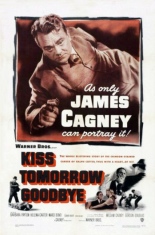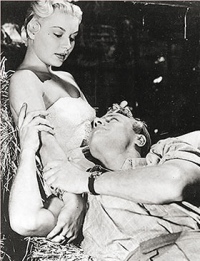
 James Cagney plays Ralph Cotter, a convict with a heart of mold. During an escape from a prison farm, his co-escapee (Neville Brand) falls behind, so Cotter shoots him in the head. Cotter than forces his way into the apartment — and arms — of the guy’s sister, Holiday (Barbara Payton). He’s a real dime-store Richard III.
James Cagney plays Ralph Cotter, a convict with a heart of mold. During an escape from a prison farm, his co-escapee (Neville Brand) falls behind, so Cotter shoots him in the head. Cotter than forces his way into the apartment — and arms — of the guy’s sister, Holiday (Barbara Payton). He’s a real dime-store Richard III.
While he’s talking his way into Holiday’s life, a moment of violence erupts that is nothing like any scene I can remember. Holiday, furious, throws a knife at Cotter, which just knicks his ear. He storms into the bathroom, wets a towel, wrings it out, then dabs it at the cut. Suddenly, he whirls toward her, draws back his arm, and begins savagely thrashing her with the wet towel. Back to the wall, she screams for him to stop, then throws herself into his arms and weeps that with her brother dead, she has no one. He suggests that she has him, and the moment ends with a kiss.
 What keeps us reeling is the way the film portrays the standard noir characters of the evil femme fatale and the hapless sucker who knows she’s using him, but still can’t break away. In Kiss Tomorrow Goodbye, Cagney’s character is the dangerous dame, and Payton’s is the entangled schmuck.
What keeps us reeling is the way the film portrays the standard noir characters of the evil femme fatale and the hapless sucker who knows she’s using him, but still can’t break away. In Kiss Tomorrow Goodbye, Cagney’s character is the dangerous dame, and Payton’s is the entangled schmuck.
Payton is gorgeous, but her career didn’t last very long. Her own worst enemy, she died at age 39, abetted by drugs and drink. Kiss Tomorrow Goodbye (a great noir title, by the way) was directed by Gordon Douglas and the screenplay was by Harry Brown, from a novel by Horace McCoy. —Doug Bentin
